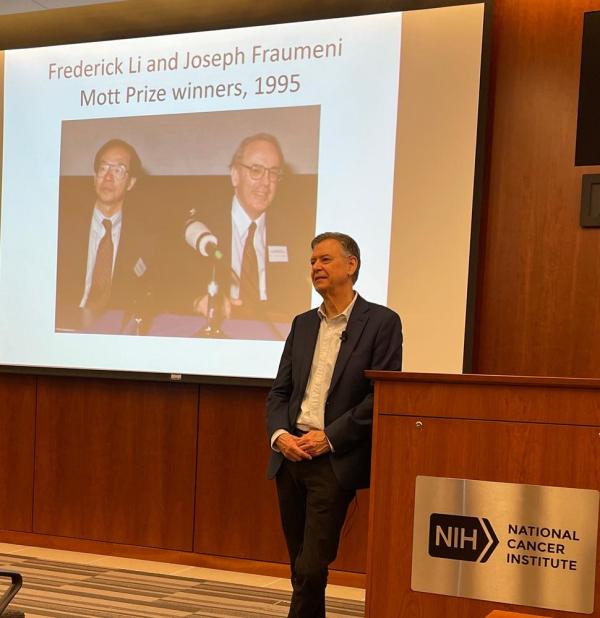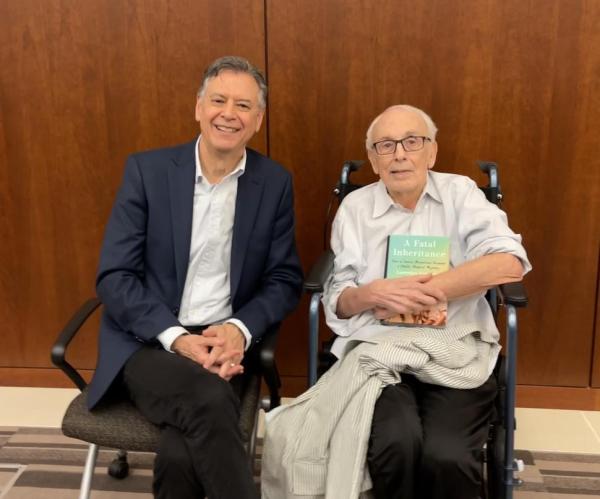NIH Book Talk Highlights IRP Cancer Research
"A Fatal Inheritance" Author Larry Ingrassia Discusses His New Book

Lawrence Ingrassia visited NIH in June to discuss his book on Li-Fraumeni Syndrome (LFS), a genetic condition discovered by IRP researchers that dramatically increases patients' risk of cancer.
In June 2024, Mr. Lawrence Ingrassia visited NIH to give a talk about his book, A Fatal Inheritance: How a Family Misfortune Revealed a Medical Mystery, which evolved from interviews with current and former IRP researchers, including IRP scientist emeritus Joseph F. Fraumeni, Jr., M.D.
Li-Fraumeni Syndrome (LFS) is an inherited disorder caused by deleterious variants in the TP53 tumor-suppressor gene that lead to very elevated risk of cancers, including sarcomas, brain, breast, and many others. Investigators at NIH have followed families with LFS since the syndrome was first described in 1969 by Dr. Fraumeni and his late collaborator, Dr. Frederick P. Li. Drs. Li and Fraumeni’s seminal discovery was the foundation on which studies of genetic susceptibility to cancer were built.
Today, over 230 families participate in the LFS clinical study, which quantifies cancer risks, evaluates screening modalities, and assesses psychological and social challenges faced by families with LFS. A subset of study participants come to the NIH Clinical Center in Bethesda, Maryland, for annual MRI-based cancer screening and to meet with clinician-scientists in the Clinical Genetics Branch (CGB) at NIH's National Cancer Institute (NCI).
In 2019, Lawrence Ingrassia, a former editor and reporter for the Wall Street Journal, New York Times, and Los Angeles Times whose family has not been a part of the NCI study, contacted Dr. Fraumeni to request an interview for a possible magazine article about LFS, the syndrome which resulted in the deaths of his mother, three siblings, and nephew. In March of 2020, he came to the NCI to meet with Dr. Fraumeni and NCI staff. The result of those initial and many subsequent discussions is the newly published memoir and medical mystery, A Fatal Inheritance: How a Family Misfortune Revealed a Medical Mystery.
In June 2024, Mr. Ingrassia came to the NIH to give a seminar during which he described the unfolding of this project and his family’s story to a rapt audience in the Joseph F. Fraumeni, Jr. Conference Room, including some of the leading current and former scientists engaged in the study of LFS. Some were meeting for the first time, or after many years. Among the luminaries in attendance were Dr. Fraumeni and Dr. Elaine Shiang, the wife of Dr. Li, and former IRP scientists Drs. William Blattner, Robert N. Hoover, and Margaret Tucker. Each played a part in supporting or directing LFS research at the NCI. Drs. Esther H. Chang and Kathleen Pirollo, now scientists at Georgetown University, made significant contributions to understanding the association between TP53 and LFS.

Ingrassia (left) and Dr. Fraumeni (right)
The event was spearheaded by IRP senior investigator Sharon A. Savage, M.D., and IRP Lasker Scholar Payal Khincha, M.B.B.S., M.S.H.S., who leads the the NCI LFS Study.
“It was a truly inspiring day of science and reminiscing that showcased how rare disease studies lead to insights applicable to the general population,” said Dr. Savage. Dr. Khincha added, “Events like these provide a critical reminder of the interconnectedness of physician-scientists and the valuable contributions of study participants.”
Mr. Ingrassia, at several moments overcome by emotion, described the evolution of his project. In partnership with investigators and staff at the NCI, Harvard, and other institutions, he was able to track down the Kilius Family, “Family A” from the original 1969 paper in Annals of Internal Medicine. The book unfolds across the lives of the two families, the lives of the researchers, and the scientific advances in cancer genetics resulting in the identification of TP53 and the development of clinical management protocols families with LFS.
This piece was originally posted on the NCI Division of Cancer and Epidemiology (DCEG) website. Subscribe to our weekly newsletter to stay up-to-date on the latest breakthroughs in the NIH Intramural Research Program.
Related Blog Posts
This page was last updated on Monday, June 24, 2024
